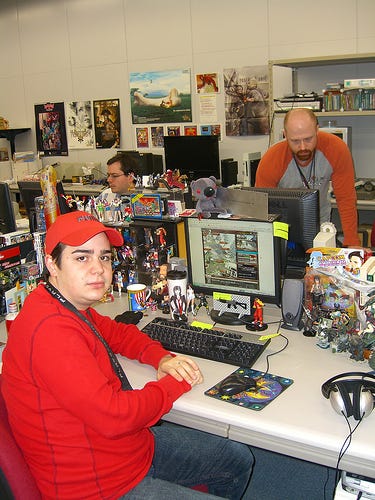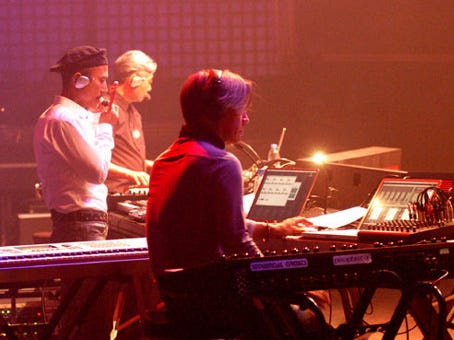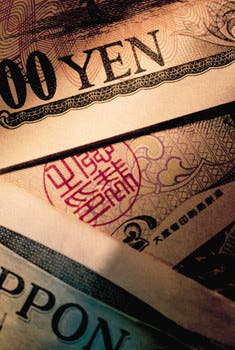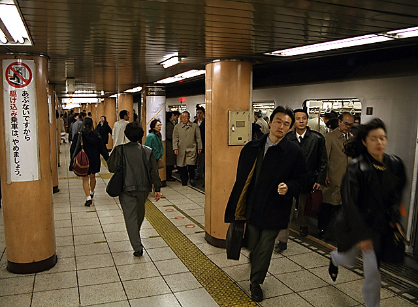Trending
Opinion: How will Project 2025 impact game developers?
The Heritage Foundation's manifesto for the possible next administration could do great harm to many, including large portions of the game development community.
So you're interested in getting a development job in Japan after reading our <a href=http://www.gamasutra.com/view/feature/1531/working_in_japanese_game_.php>first article</a>? JC Barnett, a Western developer in an Eastern world, continues his candid look at the particulars of working in Japan for all development roles -- with insights into salary, cultural differences and more.
August 20, 2007

Author: by JC Barnett
[In the second part of an informative two-part Gamasutra series, pseudonymous Japan-based game creator JC Barnett takes a deeper look at how game development works in Japan and how you can find your place in this storied industry. For the first part, click here.]
In the previous article I wrote about the very basics of moving to Japan to work in the Japanese game industry. In this article I’ll explain a little more in detail the various roles you could apply for and some general insights into the development culture here.
Obviously the roles that need to be filled in a Japanese development team differ little from those in the West, but some are more suitable for foreigners than others, for various reasons.
Unsurprisingly most foreigners can be found in localization teams. It’s probably the best way in from other industries if you have little or no development experience. The most popular industry providing game development with its localizers seems to be the lucrative English teaching machine. English teachers find themselves with enough time to study Japanese and become really good at it quickly if they put in the effort. It’s also the role where westerners are almost automatically more qualified than their Japanese counterparts, especially as there are fewer Japanese that have mastered English as well as there are westerners that have mastered Japanese.
Though there are some “rewriter” roles available, where you’ll correct translated texts, you’ll be in higher demand if you can actually translate from the Japanese yourself. Your best bet is to apply to bigger companies as the smaller ones usually outsource this work or let the publishers handle it. There are some specialized localization companies around too, so you’ll have plenty of avenues to explore.
I don’t think I need to comment on the level of Japanese required for this work, but just in case: the better you are, the better your chances of landing that job. A minimum of JLPT1 would seem to be a proper requirement. JLPTs, or Japanese Language Proficiency Tests, are yearly examinations organized by the government where foreigners can get certified for four different levels of Japanese proficiency, with level 1 being the highest. At level 1 you’re not fluent yet, though. Apart maybe for localization roles few game companies actually care about JLPT certification, so it’s not necessarily required, though it may set some worried minds at rest having it on your resume.

The Japanese development environment should look pretty familiar to you -- represented here by Capcom's localization department in Osaka, and staff member JP Kellams
Artists are referred to as “designers”, “CG designers” or even, though not usually, “graphickers”. When it comes to actual, in the trenches development this job requires the least Japanese ability, though a minimum of “conversational level” is highly recommended. Of course you can point at the screen and use a lot of body language and dictionaries but eventually this will hurt your chances of promotion and continued employment. Design documents, meetings, bug lists will all be in Japanese so I highly recommend being a competent speaker.
The job itself differs little from its western counterpart apart from the fact they seem a little more obsessed with detail here, even if it goes to the detriment of the schedule. Be prepared for a lot of rework and re-doing as the design changes during the development process. In Japan, visual design, as game design, is considered more an art than a science so people have no problem demanding changes, minute or vast, regardless of the schedule if they think it will make for better graphics. This can be a little frustrating but it’s something you’ll have to get used to.
All major software packages are used and the standard for 3D seems to be Maya, though a few rogue studios may still work with 3DS Max or XSI. Software is mostly localized so you’ll probably stumble a little bit at first in Photoshop, but some packages, like Maya, allow for English UI settings. In-house tools will be in Japanese, though.
Once you start getting in senior and lead positions you’ll have to rely on Japanese a lot more. Documents that you need to read or write and all the many many meetings you’ll be roped into will only be in Japanese. Needless to say lead positions are unavailable until your language improves sufficiently.
One small stumbling block for artists is the recondite nature of Japan’s visual aesthetic. You can often, in retrospect, learn to understand why certain things are popular in Japan but it is very hard, as an outsider, to create something that really appeals to the locals without a certain amount of luck being involved. There are some cultural issues you can easily learn with regards to visual inputs and colours but beyond that it’s a bit of a No Man’s Land. This is a problem especially with 2D and graphic design, and I recommend listening to and asking for help from Japanese colleagues.
Programming too differs little from the West apart from the fact a lot of Japanese developers still hard-code many things, which can lead to immense problems later on in development. Here too a minimum of conversational level Japanese is required until you move into lead positions when you’ll need to be a lot more fluent. All documents and bug lists will be in Japanese but if you request digital copies of all correspondence you could use on-line translators and copy/paste the more difficult kanji into, for example, Jim Breem’s excellent Japanese dictionary.
Programmers, I am led to believe, are very much in demand right now, especially if they come with next-gen experience. Japan’s schooling system just isn’t providing the industry with the young, raw talent it so needs, or at the very least not enough. A keen foreign programmer could find himself in a seller’s market. It’s fairly obvious the West is far ahead in the technical aspects of game development and more and more companies are beginning to realize the problems Japan has in this field.
Few companies buy engines, but this may be a shifting trend. Unreal or Renderware experience may count for less in Japan, apart from those few studios that have publicly announced their intentions to use them. These companies specifically will be interested in western coders with the right experience.
Designers are called “planners” in Japan and it sums up the job pretty accurately. As most games are ultimately designed by the director rather than a team of designers, the Japanese planner can find himself as an asset manager, list maker, or bug tracker rather than getting his teeth really into the design side of things. With a director, if you’re lucky, you’ll have an auteur who steers the direction of the game into a focused ideal vision or, if you’re unlucky, a manager who occasionally disrupts the flow of things by ordering changes on a whim. As such a planner’s work is never done.
As Microsoft Excel is probably your main weapon and tool, your Japanese needs to be up to scratch. You’ll need to take direction and write and communicate to the rest of the team. To be honest, I have not come across any foreign planners yet, though it is a job a foreigner could easily do if his Japanese is good enough. How much actual design you’ll be doing depends on the company, of course, as well as your immediate director and his dreams and vision.
Testing, as the more unglamorous role is usually called, is not so much a separate role in Japan as it is in the West. The task is usually relegated to regular team members who have finished their part in development. A programmer or artist can find himself playtesting for weeks or months before the project goes gold, or “master up” as it is called here.
Publishers take on some of the testing responsibilities and these tasks are often outsourced to other, smaller companies. If you’re working at one of those tiny developers and times are lean you may be “hired out” as a tester, regardless of your actual role. As such inexperienced foreigners looking for a way into the Japanese industry should best look at localization rather than QA, as is the norm in the West.
Internal producers are usually promoted out of their original development roles within the company. External producers, from the publisher’s side, can come from anywhere, including outside of Japan. As the producer’s role revolves around a lot of paperwork and communication your Japanese needs to be good. You’ll be in meetings, drafting preliminary design documents and overseeing the production, so if your Japanese is lacking there’ll be no good way of doing this job. At some publishers you may even need to oversee the marketing of your project, which will lead to problems for foreigners.
This role differs very little from that in the West except that outsourcing music and sound effects seems more popular than having an in-house studio. Only the largest companies will have dedicated sound-proofed recording studios. It’s more likely you’ll be given a slightly bigger desk and an affordable set of headphones.
Again, your Japanese needs to be up to scratch as you’ll be dealing with asset lists created by the planners. As for the difference in tastes, well, there are many. I have little good to say about popular Japanese or game music but it seems to require a particular crazy bent in the brain to come up with some of the stuff you hear. I’m sure highly talented musicians could find work in Japan, but apart from already famous DJs I have seen little evidence of foreign audio types.

As you can see, most roles only differ cosmetically from Western job titles. If you have a decent amount of experience in game development in the West there is absolutely no reason you won’t be able to do your job in Japan with equal gusto. It’s only some of the cultural thinking and ways of doing thins that can cough up some problems, but with a little patience these can be overcome or accepted.
One hears a lot of speculation about hierarchy in Japanese work and society. Though there are rules and people generally adhere to them rigidly, the game industry -- like elsewhere -- isn’t quite so strict. Leads usually do have their own desk positions overlooking rows of staff, and usually orders that come from up high are followed and hardly ever openly questioned. However, you don’t much see the deep bowing and polite Japanese (called "keigo") when people talk to their superiors.
In more business aspects of the industry things may be a bit more formal, but on the work floor it’s not something that governs the atmosphere. If your boss is so inclined you can have a very informal relationship with him and if you’re keen you can give your input on design issues and decisions, but do not expect these to be followed all the time, if at all. In the end they make the decision and yours is not to question why.
You also hear stories of “settai”, the obligatory drinks with the boss after work. Again this is not so prevalent in games but if you do go out with the boss or colleagues you can expect the atmosphere to be very informal and drunken.
The main stumbling block for those considering ingress seems to be the reputation the Japanese industry has with regards to working hours. “The Japanese,” people generally think “work long hours”. This is true but only on the surface; it ignores some fundamental truths that lie behind the phenomenon. Especially in the games industry people often start late. Working until 11 o’clock at night isn’t half as impressive if you come in just after lunchtime. Because the culture dictates that it is bad form for a lowly employee to leave before the boss does, many people have resigned themselves to the fact they won’t be going home at a normal hour, so often they try to fill the time during the day with short naps, reading manga or generally procrastinating rather than hard focused work. So it is true the Japanese work long hours, but they don’t necessarily work hard or smart.
As an outsider this can put you at a bit of a disadvantage. You’ll be expected to work late but you’ll probably actually work during office hours. This means you’ll burn yourself out quickly. Luckily, as an outsider, you can sidestep some cultural rules, including this one. As long as your work is of a good standard and finished on time there is no reason for you to force yourself to stay late. It may take some time but you can make your employers expect more regular hours from you.
Due to Japan’s national shibboleth, indecision, pulling extra overtime during crunch is sadly unavoidable. Changes are requested with scant regard for deadlines and if it means you have to work a few weekends to get it done, rather than move the deadline back a few days, then so be it. Not so much because the Japanese are meant to be polite but rather the mortal fear of “causing a ruckus”, people generally go along with this and you’ll see many colleagues take off sick days or half-days to cope with their inevitable exhaustion.
I reiterate that as a foreigner you have the means to break this pattern and I highly recommend you do so. Working at a western pace following Japanese hours is a sure-fire route to mental and physical collapse.
What should be more worrying to those considering the move is the onerous matter of wages. The salaries paid to game developers are low compared to the West, especially the US. Even in more leading roles you’ll be lucky to expect half of what your western counterparts are earning.
Wages are based on age, rather than experience, and though there is a very slight edge the programmers have over other disciplines it is far less pronounced than in the West. Graduates with no experience earn wages hardly better than fast food workers, and seniors will have to take quite a pay cut for the “privilege” of working in Japan.
There seems to be a glass ceiling, which I’ll draw here with broad brushstrokes, at around the 5 million yen per year mark (US$41,000, EU 30,000). If you ask for more than that most companies will start sweating profusely around the collar and fewer still will happily pay out. It is possible to earn more than this figure but you will be limiting our options and you may have a fight on your hands during the negotiation process.
Stories have been told of exuberant bonuses though, but again the full story remains hidden from view. Bonuses are, in a strange cultural twist, taken from your monthly salary and paid out once or twice yearly in one chunk. Different companies have different systems: some count 14 months to a year, others more, as high as 16 or 18. What this means is that your yearly salary is divided into, for example, 14 parts, one part of which you get as your monthly wages and two parts which are given as bonuses in either one chunk of 2 months’ wages or two chunks of 1 month’s worth. Of course, these bonuses can go up, if the performance review system allows it, but also down, but hardly ever more than in single figure percentages. In short, your company keeps part of your salary sitting comfortably in its banks until it pays it out at fixed dates in full or in part.
 Now you may think to yourself “hey, if I just negotiate a good monthly salary I can see the bonuses as extra, as they should be. Then the differences are purely semantic.” Well, not quite. When you first start your work it is likely you’ll be given a probationary contract, or “keiyaku”, a contract for a fixed time, usually three or six months. Should you be successful you may be given one more of these for the duration of the project, or one year, or some such arrangement.
Now you may think to yourself “hey, if I just negotiate a good monthly salary I can see the bonuses as extra, as they should be. Then the differences are purely semantic.” Well, not quite. When you first start your work it is likely you’ll be given a probationary contract, or “keiyaku”, a contract for a fixed time, usually three or six months. Should you be successful you may be given one more of these for the duration of the project, or one year, or some such arrangement.
These contracts usually exclude bonuses, though they should provide all the usual benefits. After the successful completion of your first few contracts you may, if you so desire, ask to be made “seisha'in”, or full employee. There are benefits to this. For example, more job security; it makes you equal to your Japanese colleagues and it can help your status as an alien in getting permanent residency. However, these contracts do include the bonuses, if the company works that way. The yearly salary you had as a contract employee is now suddenly divvied up into smaller chunks and your monthly income could drop dramatically. It is therefore imperative, if your aim is to become a full employee in the long run, to ask your company during the interview about its bonus system. You may then want to base your desired salary on that, rather than an acceptable monthly income you are paid as a contract employee.
To offset these low wages Japan's cloud does have a few silver linings. The tax rate is quite favourable, all things considered, and the health insurance very good. Since you pay a percentage of your previous year’s earnings, newcomers to Japan can enjoy a year’s worth of cheap health insurance. Companies send their employees out on a yearly basis for rigorous health checks that examine you more thoroughly than you could imagine. One major annoyance of mine is the fact you have to pay residence tax but are not given residence papers, but that can hardly be blamed on the game industry. Japan’s government has a lot of little obtuse bits of red tape that can make you feel as welcome as a cow at a lactose-intolerance awareness picnic.
One dubious aspect that foreigners may find difficult to cope with is the implicit sense that the company “owns” you once you’ve signed that contract. Job descriptions aren’t set in stone and the usual caveat of “plus whatever we ask of you” is added to most contracts. An employer will not think twice of lending you out to a friendly company to help out, setting you up for bug testing, asking you to move desks around or to do cleaning duties and likewise the Japanese staff don’t think twice about putting up with that.
The culture is very much “do what the company asks of you, do what you can for the company”. Putting your foot down and pointing out that your job as a coder or artist doesn’t require you to do heavy lifting won’t do you much good. These things sort of come with the territory. And though I am a quite vocal advocate of employee rights and “looking after yourself first and foremost” there isn’t really that much you can do about it if you’re put in the position of having to do certain tasks not outlined in your contract, other than quitting or threatening to quit. To a certain extent you’ll have to play along if your tenure in Japan is to last for any length of time.
Japanese contracts are usually very short and don’t cover much ground. They usually refer to a company rulebook which, by law, your employer must make you read. Some, but not all, companies will ask you to sign a non-disclose agreement but this is implied anyway. So even if you don’t sign one it is not carte blanche to shoot your mouth off to whomsoever you want about whatever you want.
Similarly there would be a clause claiming all work done by the employee belonging to the employer, though how far this stretches outside office hours isn’t clear to me. There seems to be a lot less hobby work or work on the side going on in Japan. With the long hours people simply don’t have the time or energy for it, I guess. If you do plan to do game-related work on the side, it is advisable to discuss it with your employer nonetheless.
 Holiday days usually are not given until 6 or so months into your first contract. If you want to take time off before then, or if you’ve run out of spare holidays, you can either take a hit in the wages, where the company will simply dock you for the days missed, or work a few weekends or holidays to rack up a few “daikyuu”, compensatory holidays. In Japan there are no such things as sick days! If you wake up feeling dreadful, just do what the Japanese do and go to work anyway, infecting all your colleagues and co-commuters. Colds and flu in Japan can last for weeks as they get passed round the office. Not everyone is considerate enough to wear those facemasks you sometimes see.
Holiday days usually are not given until 6 or so months into your first contract. If you want to take time off before then, or if you’ve run out of spare holidays, you can either take a hit in the wages, where the company will simply dock you for the days missed, or work a few weekends or holidays to rack up a few “daikyuu”, compensatory holidays. In Japan there are no such things as sick days! If you wake up feeling dreadful, just do what the Japanese do and go to work anyway, infecting all your colleagues and co-commuters. Colds and flu in Japan can last for weeks as they get passed round the office. Not everyone is considerate enough to wear those facemasks you sometimes see.
Another problem Japan as a whole suffers from is gender inequality. At first this may seem surprising as you’ll find more women working in games than you’ll find in the West, by a fair margin, but the status they enjoy is a little depressing. Women are often still seen as part-timers. They work as full-time employees but the general consensus seems to be that they’ll end up marrying and quitting their jobs to become housewives and mothers. Why then should a company invest time, money and effort in helping them along with their careers?
This situation isn’t helped by the attitude so many Japanese women have which is exactly in line with what is expected of them. Many yearn to wed and quit working, making it so much harder for those women intent on building a career. Especially in more formal business situations women can still be looked down upon and generally treated like second class citizens; pretty citizens, but not real businessmen. That, you see, is a man’s job.
This gender inequality isn’t really visible in daily life in the game industry. Women form a significant part of the workforce and of course do their tasks as well as any man, a few even out-geeking some of them. Foreign women may have a bit of a hard time with it. Japanese men seem to be either obsessively excited by western women or mortally afraid of them. At least women aren’t a rarity in the industry here, so possibly foreign women won’t experience extra obstacles in joining it.
Sexual harassment could be a problem though -- as there is a law against it but no real way to enforce it, as is the case with racism. There is no epidemic, and reports of actual sexual harassment aren’t prevalent. Nevertheless, for any women making the move, a certain sense of assertiveness would be massively helpful.
Discrimination based on not being Japanese does occur but strangely it is almost exclusively the kind of positive enforcement of the idea foreigners are somehow better. If you are the sole foreigner at a company you may get a certain celebrity status and people will think you much cooler than you actually are. This is probably why people who return home after a prolonged stay in Japan are such insufferable bores. It must be hard to climb down from this pedestal and return to a life of everyday mediocrity.
It’s very difficult not to get a little big-headed when you live in Japan, with people commenting on how foreigners are so much more handsome or beautiful, comparing you to all manner of movie stars to whom you bear very little resemblance and being invited to wedding parties as the token “foreign ‘friend’” of the groom or bride. That said, don’t expect a lot of special treatment when it comes to work. Apart from being outside the culture of obligation you can get away with more if you try, in general you are still expected to do your work and do it well. I have in my time here only once experienced outright aggressive xenophobia, but never ever at work. Being foreign, or not being able to communicate well enough in Japanese, may be used against you at some point, but more in a way of controlling staff or denying over exuberant demands; it won’t ever be a true discriminatory factor in the sense that you’re seen as a lesser human for not being Japanese. And your language skills may actually not be adequate, either; this is something you’ll constantly have to work on, but it’s your responsibility, not your employer’s.
I cannot comment on the status of Asian foreigners in Japan. I know from personal observation there is a particular animosity between the Chinese and Japanese and I can only surmise Chinese nationals working in Japan may have a harder time of it. Western foreigners though, which includes African-Americans, won’t have much trouble in their everyday lives, in private or at work, apart from the occasional stares or empty seats next to you in busy trains, which has more to do with the fear of possibly having to speak English than any disgust at foreigners.

But all things considered it is the culture of Japan where foreigners may stumble most. In the West you’re assertive and confident but in Japan you’re arrogant. In the West you are focused and driven, in Japan you’re difficult and unmovable. There are many little differences that can make life in Japan a bewildering experience. Many of the things I discussed above may not even occur to you; they may not be the case in your specific situation or you simply cannot see them because the Japanese avoid the direct approach and deal with everything in a roundabout way -- insinuating, relying on context and mutual understanding or delegating. You will never be told your work is not good enough, nor will you ever be told you’re leaving the office too early. After a long meeting you may feel nothing has been decided yet everyone else seems to know what is expected of them. Certain types of boss may sometimes flip out and scream at employees but generally you’ll have to interpret carefully what is desired or expected of you.
You’ll pick this up soon enough though; it’s not something to be very worried about, but especially if you’re new to Japan you will need to know things are done differently here. Carry yourself with confidence but be careful not to be seen as arrogant. Be open to the flows of change that are never directly communicated, only insinuated. Try not to be too direct in your dealings with your superiors as it can put them on the defensive. And if you ask an employer if you really need to come in over the weekend and he replies “no”, it doesn’t necessarily mean you’re off the hook quite yet.
Other aspects of work follow the West’s example too closely for lengthy exposition. There is, for example, no dress code unless you’re on the business side of things, work floors are usually open plan with or without dividing cubicle walls, coffee and tea are provided and a microwave, fridge and kettle available for use. Most companies will have a vending machine for soft-drinks and bottled water, usually but not exclusively set to ever so slightly lower prices than the one outside on the street.
Companies usually organize a party, lavish or cheap, to celebrate the end of a project and employees seen to have worked a lot of overtime are not punished for being inefficient workers but given a few days off in lieu. You may or may not get a free copy of the game you’ve worked on. You will be roped into endless meetings scheduled to start just before you planned to leave the office and lasting a few hours longer than is necessary. And despite the strangely prevalent idea that the Japanese are somehow superior at making games you’ll find your colleagues will be a healthy mix of highly talented and inspiring developers and inexperienced or inefficient ones. You get the picture.
I am acutely alive to the fact I may have painted working in Japanese game development slightly more negative than is ultimately called for. Sure, working in Japan isn’t all rosy, but with the right mindset you can get some things out of it. As I never tire of saying, Japan is a pretty decent place to live and even with the low salaries in the game industry you can, if you’re a prudent spender, live comfortably enough. For the focused applicant there is a real chance to be working on those games you love and that possibly drove you to Japan in the first place.
 And -- let’s be coy about this -- there are certain perks attached to working in the Japanese game business. Simply because there aren’t so many of us, yet it’s a dream for so many, a lot of people will live vicariously through you and hang on your every word. These kudos, of course, butter no parsnips and the novelty wears off quickly as you’re faced with the everyday realities of working here. Soon enough the idolatry will die completely as more and more foreigners move to Japan to help it bridge the already evident technological gap between here and the West -- with the West solidly ahead and gaining ground. I, for one, certainly hope so. Paradoxically what the Japanese industry really needs is more outside influence and foreign workers to keep it competitive.
And -- let’s be coy about this -- there are certain perks attached to working in the Japanese game business. Simply because there aren’t so many of us, yet it’s a dream for so many, a lot of people will live vicariously through you and hang on your every word. These kudos, of course, butter no parsnips and the novelty wears off quickly as you’re faced with the everyday realities of working here. Soon enough the idolatry will die completely as more and more foreigners move to Japan to help it bridge the already evident technological gap between here and the West -- with the West solidly ahead and gaining ground. I, for one, certainly hope so. Paradoxically what the Japanese industry really needs is more outside influence and foreign workers to keep it competitive.
And to hint at credit where it’s due, some companies are taking steps towards improving the quality of life for their employees. Some are actively trying to reduce crunch, some are even working on paid overtime schemes with an eye on avoiding it altogether. Some companies have realized the foreign markets dwarf the local one and have decided to focus on more global product development, bringing along with it better working attitudes, development practices and even wages.
Like most things in Japan these changes are slow, but they are happening. I can not in good conscience name or shame any companies -- as one person’s hellish sweatshop is another’s employment paradise. Herein lies the true challenge of working in games development, in Japan or any other country. It’s up to you to find a place where you “fit”, where you are happy and content. Success in this task lies in luck, job hopping and focused job applications, all helped along with a growing network of contacts. And with this in mind it is absolutely possible to find a great place to work in Japan, somewhere that suits you personally, but with cultural chasms to bridge, a whole new language to learn and a tiresome process of immigration and the red tape that that brings with it one may feel it is all rather untenable.
I can only repeat: don’t give up! If this is something you feel you want to do, then there is nothing for it but to try. It’s not prohibitively difficult, it’s certainly not impossible.
Read more about:
FeaturesYou May Also Like